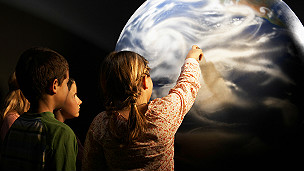Vocabulary: Science 科学

Science has the power to capture children's imagination
收听与下载
Sci-fi movies tend to capture children's imaginations and have long been part of students' excited chats in the schoolyard. But now a scientific journal has urged at least one sci-fi movie to be shown in class by science teachers.
Scientific papers published in the American Journal of Physics (AJP) and in Classical and Quantum Gravity have seen merit in the way the movie Interstellar portrays wormholes.
Dr David Jackson from AJP said publishing this paper "was a no-brainer". He added: "The physics has been very carefully reviewed by experts and found to be accurate. The publication will encourage physics teachers to show the film in their classes to get across ideas about general relativity".
In fact, one of the executive producers of Interstellar was Kip Thorne, a professor of theoretical physics at the California Institute of Technology (Caltech). For him, films such as Interstellar, Contact and 2001: A Space Odyssey can inspire young people.
Blockbusters are improving when it comes to portraying scientific theories. An initiative by the US National Academy of Sciences has been putting proper scientists in touch with movie people to achieve a better result - which is vital in the internet age. Interstellar's director Christopher Nolan says: "Consumers have a lot more immediate access to information. If you go and see a film about a particular subject, particularly a true life story, you can go home and look it up on Wikipedia and see if the basic things portrayed in the film are true or not. The same is true of science in the films".
Professional scientists may no longer cringe in their seats when they watch sci-fi movies. Today, getting the science wrong is no longer an option.
Glossary 词汇表 (点击单词收听发音)
- sci-fi科幻
- to capture (someone's) imagination激发某人的想象力
- a scientific paper科学文献
- physics物理学
- interstellar星际的
- a wormhole (space)时空虫洞
- a no-brainer显而易见的事
- accurate准确的
- general relativity广义相对论
- technology技术
- a blockbuster畅销的书、电影或电视
- a theory一种理论
- proper专业的,科班出身的
- the consumer消费者
- to cringe感到难堪












